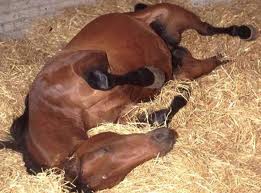7 Tips for Feeding The Older Horse

Currently I am riding an 18 year old horse and he is amazing! Eighteen used to be considered "old" but with the advances in nutrition and preventive health care we have seen, horses can expect to have longer and more productive lives. So I guess 18 is the new 8!
It's common for many horses to live well into their late 20s and early 30s. I have even met a 51 year old pony! Some folks call me with concerns for their old guys due to weight issues. Plus, with cooler weather around the corner for many areas, this can become an even bigger issue.
In general, the diet of all older horses should be highly palatable, dust-free, easy to chew and digest, and be based on digestible fiber instead of grain. It should also be low in sugar and starch content, have a 12 to 14% crude protein, and contain added B vitamins, vitamin C and possibly additional fat depending on the individual metabolism of each horse.
In an effort to keep it simple and to help you take the BEST care of your older horse I am offering the following general tips on feeding the older horse.
First things first....
1) Schedule regular dental examinations for your older horse. Many horses have sharp points that develop on the edges of their molars that need to be filed down or floated. If hay and feed are not properly chewed, the horse may not be able to digest them well enough to obtain sufficient nutrients. If you notice your horse having trouble chewing, if he commonly drops his feed during mealtime, or he spits out balls of hay or grass, it is time to schedule a visit from the dentist.
2) Wet the feed, making a mash or soup for the senior horse. Some older horses may have lost enough teeth or their teeth are worn down enough that they are unable to properly chew even senior-type feeds very well. Adding some warm water to the feed and allowing it to set for 5 to 10 minutes before feeding will allow the dentally-challenged horse to chew or swallow its feed better, and reduce the risk of choke and impaction colic.
image from www.taringa.net
3) Feed your older horse apart from aggressive eaters. If you have several horses together and don't have stalls to feed them individually, separate your older horse from the group so it can be fed alone. Unless your older horse is the most dominant horse in the group, it is not likely that he would be able to have the time alone to finish his feed.
4) Select a senior horse feed containing highly digestible fiber sources. Highly digestible sources of fiber include beet pulp, soybean hulls and alfalfa hay. These feed ingredients are easily broken down in the horse's digestive system, providing more calories and a lower risk of impaction colic than less digestible fiber sources. Feeds for older horses contain more fiber than conventional horse feeds. Senior feeds can be consumed at higher rates than conventional horse feeds and are designed to replace most of the hay or pasture that the horse would normally consume. That's the reason they are called "complete" feeds, they contain enough fiber that they can be fed as the sole diet. Most “complete” feeds contain shredded beet pulp as a major ingredient. Beet pulp is naturally low in starch and sugar (only 12%) and contains more calories per unit than most alfalfa hays, making it a great fiber choice for older horses needing to gain weight. Another good choice would be a pelleted formula based on soybean hulls (only 6% sugar and starch) and make sure they include alfalfa meal and beet pulp, all good sources of highly digestible fiber. One of my favorites is Triple Crown Senior.
5) Choose a senior horse feed with a high fat level (6% to 10%). The older horse easily digests fat in the form of vegetable oil, which is the preferred form of fat for the horse compared to animal fats. Fat is a concentrated source of calories, containing more than twice the calories per unit than carbohydrates, which make up the majority of calories found in grain and hay. Many older horses will be affected by Cushing's disease, which alters normal cortisol, glucose and insulin metabolism and increases the incidence of founder and laminitis in affected horses. Look for a feed that contains high levels of fiber, and low amounts of sugar and starch, which improves glucose and insulin metabolism and reduce the risk of founder and laminitis in horses with Cushing's disease.
6) Provide some long-stemmed fiber in your older horse’s daily diet. Although most senior horse feeds are high in fiber, and can be fed as complete feeds with no added fiber, these feeds can still lack what is called the “scratch” factor that will provide bulk and promote intestinal motility, and decrease incidence of cribbing, colic and wood chewing. Even if your horse has few or no teeth, hay cubes or chopped forage can be soaked until soft and mixed into feed or fed separately to your older horse. For the dentally-challenged older horse who can only eat a limited amount of hay, use these guidelines: provide .5% of the older horse’s body weight daily in chopped forage or hay cubes (five pounds daily for a 1,000-pound horse) and provide 1% of the older horse’s body weight in senior feed (ten pounds daily for a 1,000 pound horse). Soak the hay cubes or chopped forage and senior feed before feeding, and divide the forage and senior feed into two to four daily meals.
Image from http://.twobitsovercoffe.blogspot.com
7) Provide high quality forage for your older horse. Poor quality hay is more difficult for the older horse to chew and swallow, and is more likely to cause an impaction colic. High quality hay is harvested at an earlier stage, is less fibrous and easier to chew, and breaks down quickly in the horse's digestive system, reducing the risk of impaction colic. Look for a chopped grass and alfalfa forage in bags to get high quality grass and alfalfa hay, harvested at the proper stage and chopped into small lengths, that are easy for the older horse to chew and swallow. Be sure to wet hay cubes before feeding to prevent the risk of choke and you may also wet the chopped forage to increase the ability of your older horse to chew and swallow.
With some extra TLC and attention to their diet, an older horse (like us older folk) can live a long, healthy, happy life!
I would love to hear your older equine success stories! How do you keep the sparkle in their eyes and the giddy-up in their stride?
Peace and good rides, til we meet again,
~Laura
Note: This article was adapted from one written by the smartest equine nutritionist I know Dr. Marty Adams, PhD











Leave a comment